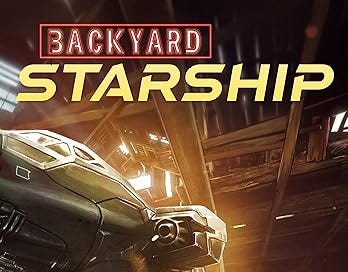BACKYARD STARSHIP is the kind of book that I really enjoy for the fact it is a work that is just pure entertainment. Some books you read because of your desire to be immersed in a fascinating and complicated world of conflicting allegiances. Other books you read because you want to have fun and the Backyard Starship series is the latter. This isn't to say the world-building is bad or the characters aren't likeable, but this very much feels like someone has written out an episodic TV series.
The premise is Van Tudor, former Army Intelligence man, inherits a starship from his grandfather. Unbeknownst to Van, his grandfather was a Peacemaker and served in an organization that is a bit like Mass Effect's Specters with a more mercenary bent. Basically, they're space cops but they must pay for all their own gas and resources by bringing in high-paying bounties.
The book is episodic with Van discovering his grandfather's starship resting in the barn of the house he'd just inherited. He's introduced into the role of the Peacemakers by an android parrot and slowly eased into the larger issues of the galaxy. It's a work of escapist fantasy so Van takes to the whole thing like a duck to water but never seems like he's overpowered for the setting.
Weirdly, I feel like there's a kind of MYSTERY SCIENCE THEATRE 3000 feel to Van and his efforts as he's a guy that travels around the galaxy in his starship with his robot companions. Val is pretty chill about the whole, "aliens are real, I'm part of the Green Lantern Corps/Mass Effect’s Spectres, and I owe a lot of money on the spaceship I now own." However, that's a small complaint about the fact that I never am not enjoying his reactions to the greater galaxy around him.
I also give credit to the authors for managing to get into the nuts and bolts of the setting. Van is someone who must get licenses, pay docking fees, and so on. I really enjoyed a scene where he went to a bank and had it explained how the galactic economy worked. It isn't overly exposition heavy, but you get a sense that things do work in a very specific way. We also get an explanation for why the setting is full of humans in space despite the fact Earth is still, technically, pre-First Contact.
The Peacekeepers are a pretty good concept by themselves with them being a private military as well as law enforcement force that must raise its own money to operate. It's a pretty bad thing that these mercenaries are the only thing available to enforce order in the galaxy, but the authors highlight this. Most of the Peacekeepers are aware of it too and struggle with corruption and a limit to their resources.
I also like the sci-fi concept of brain uploads and the fact the trade in scans of their minds is the galaxy's equivalent of human trafficking. Here, there's only one scan per brain and it's cheaper than programming an AI. So, plenty of people get kidnapped and their bodies destroyed while their consciousness is put to work as slaves operating machinery. It may not be scientifically accurate, but it works well as a metaphor.
In conclusion, this is a pretty good book and one that I picked up the sequel to immediately after finishing it. It’s got decent-worldbuilding, likable characters, and entertaining action. You could do a lot worse than picking this up on Kindle or Kindle Unlimited. I also recommend the audiobook version as narrated by Jeffrey Kafer.
Buy the book via our affiliate link





